Theatre Festival Boulevard is a highlight of the festival summer every year. Because there are no barriers and because it carries the casual atmosphere of the city in every fibre. But it even goes a step further. Here are my seven learning moments:
1: Boulevard is more accessible than the city itself
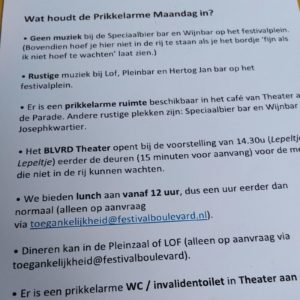 Some people find it verging on the hysterical, but I can't help but admire it: Theatre Festival Boulevard is accessible to more complicated groups every year. Once it started with wheelchair ramps at even the most complicated installations, now there are deaf interpreters, blind interpreters and, the latest addition: a day especially for people who are easily overstimulated. Such a low-stimulation Monday may cause hilarious thoughts ('get me one of those signs saying I can't stand rows'), but it is already helping on the spot for a greater understanding of the hyper-sensitive, and that they are not just posers.
Some people find it verging on the hysterical, but I can't help but admire it: Theatre Festival Boulevard is accessible to more complicated groups every year. Once it started with wheelchair ramps at even the most complicated installations, now there are deaf interpreters, blind interpreters and, the latest addition: a day especially for people who are easily overstimulated. Such a low-stimulation Monday may cause hilarious thoughts ('get me one of those signs saying I can't stand rows'), but it is already helping on the spot for a greater understanding of the hyper-sensitive, and that they are not just posers.
A pity, though, that in the music tent that afternoon, a girl with a guitar sang so outrageously out of tune that it made even a fairly excitable type like me squeal.
2: A festival is also a place for debate
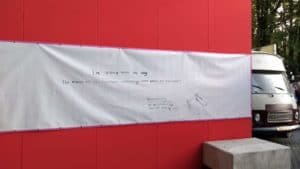 Den Bosch lacks a debate centre, so Boulevard makes room for debate. I didn't get a whole lot out of it, and the times I climbed the steel stairs to the first floor of the dying Theater aan de Parade there was whispered debate, but still. Only because a different thought-provoking question was put up on the festival square every day, you knew: if I want to say something, I can. This is bound to lead to more in future editions.
Den Bosch lacks a debate centre, so Boulevard makes room for debate. I didn't get a whole lot out of it, and the times I climbed the steel stairs to the first floor of the dying Theater aan de Parade there was whispered debate, but still. Only because a different thought-provoking question was put up on the festival square every day, you knew: if I want to say something, I can. This is bound to lead to more in future editions.
3: Den Bosch is unique, so is the festival
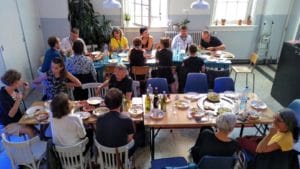
High visitors from all over the world. For four days, a motley crew of programmers and festival directors toured the venues and tents of Theatre Festival Boulevard. They were there to strengthen international cooperation between small and medium-sized festivals. After all, the big boys and girls in festival land, Avignon, Edinburgh, Vienna, already have such joint consultations through which they also facilitate major international co-productions, so the small ones do too.
I spoke to people from Lithuania, Poland, England, Belgium, France and China. All happy to be here, though some were more impressed by the programme than others. So many countries, so many tastes. That also seemed to be a bit of a problem during a group discussion about diversity and how to deal with it in your festival: an innovative theatre festival in Poland has very different things on its mind than a colleague festival in Flanders, and in China they think they can serve as an example themselves: independent festivals are visited by a very young and diverse audience there.
What they all agreed on: Theatre Festival Boulevard is unique because of its location in the city. The Parade Square under St John's, where art and recreation merge, the special venues, Frits van de bussen. Should the offerings on display sometimes divide minds, the city reunited them. Sometimes you have to talk to a foreigner to see that.
So we can now say that the various regional festivals have definitely shaken off their sameness image: Nooderzon, Karavaan, Zeeuws Nazomer and Boulevard are truly unique and each individually worth visiting, without déja vu. The same cannot be said of the 150 big city theatres in the Netherlands, each of which draws 90 per cent from the same offer, whether subsidised or 'free'.
4: Inspiration for young creators in search of a story
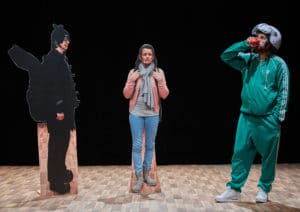
Omar Radjeh from Lebanon made me feel again what that is: theatre made from a huge commitment to a subject. That produces performances that cannot leave you cold, even though you may find them too much, too bad, or over the top. Ola Mafaalani also makes those demands on himself. I haven't encountered much theatre like this otherwise, these past few days in Den Bosch, and sometimes you can get the feeling that everything is very non-committal. Last year I missed writers, this year less so. But now something else is gnawing at me: the big story.
Maybe that is also something to start small with. For instance, when writing and playing a story about your own woes, make yourself a character. That artificial distance might well make great things possible.
5: Breasts have given way to orgasms
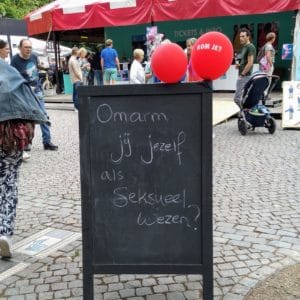 In Julie Cafmeyer's extraordinarily amusing piece 'Confessions of a White Girl', now renamed 'Bad Woman', for instance, I missed that big story. Cafmeyer told flowery stories about her sexual maturation as just short of a fashion model, and it was endearing in the way Flemish storytellers can be endearing. She has a house full of plants, not because of her green thumb, but because she puts a plant in its place for every runaway lover. How big her garden centre is now remains in the middle, but she lets us know that she now happily has a steady boyfriend with whom she experiences fantastic orgasms.
In Julie Cafmeyer's extraordinarily amusing piece 'Confessions of a White Girl', now renamed 'Bad Woman', for instance, I missed that big story. Cafmeyer told flowery stories about her sexual maturation as just short of a fashion model, and it was endearing in the way Flemish storytellers can be endearing. She has a house full of plants, not because of her green thumb, but because she puts a plant in its place for every runaway lover. How big her garden centre is now remains in the middle, but she lets us know that she now happily has a steady boyfriend with whom she experiences fantastic orgasms.
She tells all this dressed in a swimming costume. This is striking, as not so long ago she performed in a less veiled way. Telling about orgasms only requires you to expose yourself mentally, and Cafmeyer is a lot better at that than the journalist who did it in a tent earlier at this festival.
So in 2016, Boulevard was much bluer, though. I sighed something about that at the time, and now something has changed. This is not down to me, of course, but to the changed zeitgeist, and certainly #metoo ´will have contributed to it. Eighteen-year-old drama school students no longer learn that getting out of clothes is necessary for real depth, and casting agencies have also restricted auditioning in the nude. So being naked in front of an audience has become a lot less obvious. Quite a pleasant idea, actually. Can we get back to talking about content, without dirty males in Row 1.
6: More braderie please!
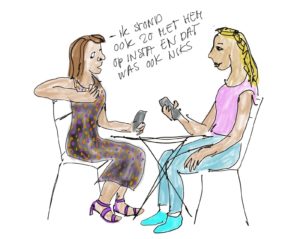
The Netherlands' most distinguished newspaper, NRC Handelsblad, was still complaining at the beginning of this festival about the braderie atmosphere on the festival square. A comment that stems from an old and rather outdated point of contention in the arts sector: that popular entertainment and great art do not mix. In fact, let it be a central point of Theatre Festival Boulevard for years now, that the two things do go together. So it has resulted in a unique festival, which could also appeal to high-ranking foreign audiences. See point 1.
Festival director Viktorien van Hulst did make sure to further curb the commercial catering on site. All food and beverage outlets - slightly fewer than before - fit into the picture, the walking route mixes art and more ordinary entertainment unnoticed, and there is still good cooking. Perhaps even better. Those wanting a bossche bol from monopolist Jan de Groot can go anywhere else in the city.
Boulevard in Den Bosch is a festival Bosschenaren are proud of, and so Bosschenaren should also be proud of themselves, because it is they who make their own festival that southern je ne sais quoi give away that makes it worth the trip every year. The best art fair in the Netherlands.
